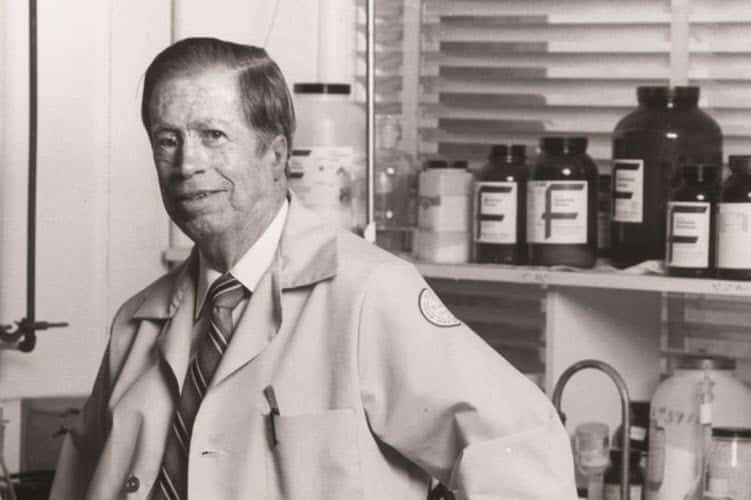Robert Bruce Merrifield (15 July 1921 – 14 May 2006) was an American biochemist who won the Nobel Prize in Chemistry in 1984.
Life and Career
He was born on 15 July 1921, in Fort Worth, Texas, United States.
From a young age, he exhibited a strong passion for science and a natural curiosity about the world. Merrifield’s interest in chemistry led him to pursue higher education and embark on a journey of scientific exploration.
He attended the University of California, Los Angeles (UCLA), where he earned his bachelor’s degree in chemistry in 1943. He continued his studies at the University of California, Berkeley, obtaining his Ph.D. in biochemistry in 1949. It was during his doctoral research that he began his groundbreaking work on solid-phase peptide synthesis.
After completing his Ph.D., Robert Bruce Merrifield joined the Rockefeller Institute for Medical Research (now Rockefeller University) as a postdoctoral fellow. It was during his time at the institute that he developed his groundbreaking method for solid-phase peptide synthesis.
In 1963, Merrifield published his seminal paper outlining the solid-phase peptide synthesis technique. This innovative method allowed for the efficient and automated synthesis of peptides, simplifying the process and making it more accessible to researchers. His approach revolutionized peptide synthesis, enabling the creation of complex peptides and proteins with great precision.
Throughout his career, Wilkinson made significant advancements in the understanding of transition metal complexes and their role in catalysis. His work laid the foundation for the development of new catalysts and provided valuable insights into the reactivity and behavior of transition metals.
In the later years of his career, Wilkinson continued to contribute to the field of inorganic chemistry. His research expanded to include the synthesis and characterization of other metal complexes, such as organometallic compounds and cluster compounds. Wilkinson’s investigations into the structures and properties of these compounds further advanced our understanding of their chemical behavior.
Robert Bruce Merrifield passed away on 14 May 2006, in New Jersey, United States.
Award and Legacy
In 1984, he was awarded the Nobel Prize in Chemistry, acknowledging his transformative contributions to the field.
Robert Bruce Merrifield’s contributions to biochemistry and peptide synthesis have had a lasting impact on scientific research and medical advancements. His innovative method has become a cornerstone of modern peptide synthesis, enabling the efficient production of peptides with applications ranging from drug discovery to understanding disease mechanisms.
His work has significantly accelerated the development of peptide-based therapeutics, leading to the creation of novel drugs and treatments for various diseases, including cancer, diabetes, and autoimmune disorders. His contributions have influenced generations of scientists, inspiring them to explore new frontiers in the field of biochemistry.

